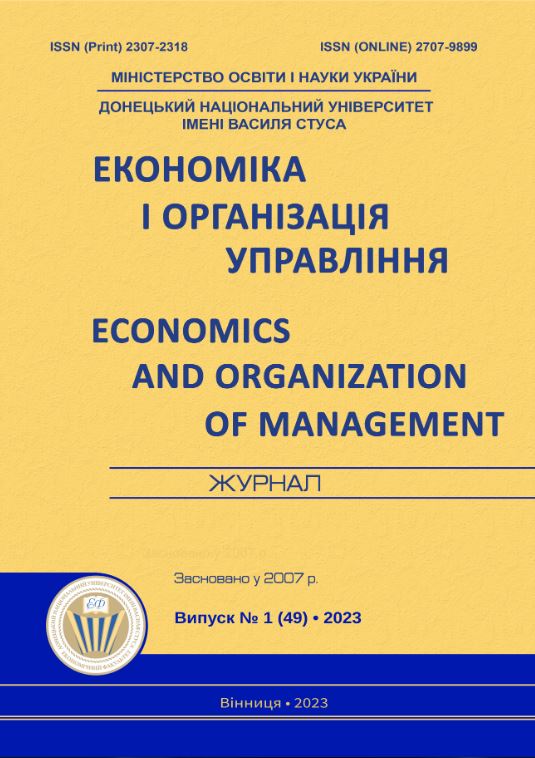Дослідження управління інтелектуальним потенціалом підприємств в умовах післявоєнного стану
DOI:
https://doi.org/10.31558/2307-2318.2023.1.6Ключові слова:
інтелектуальний потенціал; управління інтелектуальним потенціалом; післявоєнний стан; складові інтелектуального капіталу; SWOT-аналіз; сценарії формування інтелектуального потенціалу; конкурентоспроможність підприємства.Анотація
У статті проведено дослідження управління інтелектуальним потенціалом підприємств в умовах післявоєнного стану. Узагальнено наукові підходи до визначення особливостей управління інтелектуальним потенціалом. Встановлено, що суттєвої ролі інтелектуальний потенціал як складова діяльності підприємства набув у період постіндустріального розвитку суспільства – з появою цифрових технологій, значною автоматизацією виробництва та науково-технічним прогресом. Виокремлено складові інтелектуального капіталу (професійні, науково-технічні та творчі знання працівників; попередній досвід роботи підприємства; інтелектуальна власність; організаційно-управлінська структура; інновації та нові технології; інформаційні мережі). Здійснено SWOT-аналіз управління інтелектуальним потенціалом в умовах післявоєнного стану. Запропоновано сценарії формування інтелектуального потенціалу (позитивний та негативний). Зроблено висновок, що стан української економіки в контексті майбутньої післявоєнної відбудови є унікальним щодо розробки алгоритмів управління інтелектуальним потенціалом, зокрема, пропонується робити акцент на мотивованість працівників до генерування ідей, а також підвищення рівня їх креативності.
Посилання
Ostrovska H. (2018) Management by intellectual potential of enterprise. Galician economic journal (Tern.), vol. 55, no 2, pp. 88-97. Retrieved from https://galicianvisnyk.tntu.edu.ua/pdf/55/264.pdf.
Shkoda T., Tepliuk M., Sahaidak M. (2020). Intellectual potential management in forming strategic partnership of science-business-education. Baltic Journal of Economic Studies, 6(5), 221-232. Retrieved from http://www.baltijapublishing.lv/index.php/issue/article/view/946/1000.
Huang W. (2018). Human Resource Risk Identification and Prevention. Control and Systems Engineering, 1 (1), 16-21. Retrieved from https://www.researchgate.net/publication/325728047_Human_Resource_Risk_Identification_and_Prevention.
Nosova T. (2014) The economic essence of the category of «intellectual potential». Mechanism of Economic Regulation, 2, 159–166. Retrieved from https://mer.fem.sumdu.edu.ua/content/acticles/issue_21/TANYA_I_NOSOVAThe_Economic_Essence_of_the_Category_of_Intellectual_Potential_.pdf.
Dyba L.M. (2011) The essence of the concepts of intellectual potential and intellectual capital as economic categories. Economic Bulletin, 17/1, 124-129.
Moiseienko I.P. (2007) Problems of structural analysis of intellectual potential of enterprises. Current Problems of Economics, 10, 165-170.
Pererva P., Marchuk L. (2018). Intellectual potential as an economic category. Bulletin of the National Technical University «Kharkiv Polytechnic Institute» (economic sciences), 15 (1291), 53-63. Retrieved from http://repository.kpi.kharkov.ua/handle/KhPI-Press/36345.
Kimbrough R. L., Componation P. J. (2009). The relationship between organizational culture and enterprise risk management. Engineering Management Journal, 21(2), 18–26. Retrieved from https://doi.org/10.1080/10429247.2009.11431803.
Acharyya M., Mutenga S. (2013). The benefits of implementing enterprise risk management: Evidence from the non-life insurance industry. Enterprise Risk Management, 6 (1), 22–24.
Bertinetti G. S., Cavezzali E., Gardenal G. (2013). The effect of the enterprise risk management implementation on the firm value of European companies. Working Paper (10). Department of Management, Universita Ca’Foscari Venezia.
Sekaran U., Bougie R. (2016). Research methods for business: A skill building approach. John Wiley & Sons.

